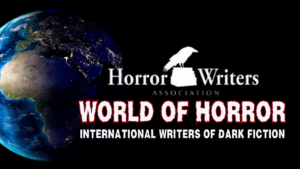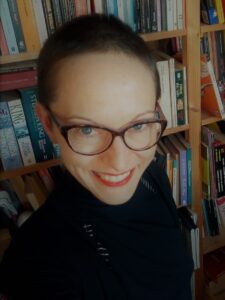World of Horror: Interview with Erica Couto-Ferreira

Erica Couto-Ferreira is a historian, writer, and translator. She is the author of the horror novelette Hemetia (Arima, 2022) and a bunch of horror and fantasy short stories that have appeared in magazines and anthologies over the years.
As a non-fiction writer, she has published in Spanish the essays Bodies. The other lives of corpses (Kalandraka, 2023), Hell. The underworld in ancient Mesopotamia (Aurora Dorada, 2020) and Infestation. A cultural history of haunted houses (Dilatando Mentes, 2021), which was a finalist of the Ignotus Awards 2022 in the category Best Essay. She has also translated W. G. Pugmire’s book Bohemians of Sesqua Valley into Spanish (La Biblioteca de Carfax, 2021).
Erica podcasts on horror, fantasy, and speculative fiction in Todo tranquilo en Dunwich and Vaya barullo en Innsmouth. She lives in Italy with her family, plays the drums, and goes book-hunting whenever she can.

What was it about the horror genre that drew you to it?
I have always been attracted to horror since I was a child. Back then, I believe I found a certain beauty and a sense of awe when looking at the dark side of things, a sort of thrill that kept me going back to the genre even if I wasn’t aware of what a literary genre was.
Is there a horror tradition in your country, in your culture? A taste for horror, a market? Not necessarily literature; perhaps oral tradition too.
Oh, yes there is. Spain is very rich in ghostly and horror-related folklore and oral traditions. I come from a very specific part of the country, Galicia, on the northern Atlantic shore, where the Christian catholic faith intertwines with folkloric practices related to nature and landscape that could be considered pagan, I guess. I grew up in a rural community where the supernatural (the belief in restless souls, death premonition, witchcraft, the evil eye, communication with the dead, etc.) was quite real and a part of everyday life. That was part of my upbringing and a key element of who I am today.
On more formal grounds, there is also a growing market of horror and weird literature both in translation and in Spanish, with dozens of new authors and independent publishers coming up each year.
Who are some of your favorite characters in horror, internationally and/or in your own culture?
I am all in for vampires in any form of art! Angeline, the main character in Elizabeth Engstrom’s The Black Elixir, Miriam Blaylock from Whitley Strieber’s The Hunger, as well as any vampire portrayed by Tanith Lee, are among my favourite bloodsuckers.
I also love ghosts and haunted houses (yes, I believe houses are characters as well). It was my lifelong fascination with haunted spaces and abandoned buildings that led me to write an essay on the topic.
Do you make a conscious effort to include characters and settings from your country in your writing and if so, what do you want to portray?
Even though I consciously try to avoid using explicit temporal and geographic references in my writing, I tend to include settings, characters, and elements from the place I happen to be living in. Now it is mostly Italy, although in the past I have used elements from my Galician heritage, such as the mouras (creatures of great beauty, often found in natural environments, that trick human beings) or the Ciprianillo (a black magic book that was rather popular among the peasant communities). I need to relate physically to what I am writing, and, for me, the best way to do this is by drawing inspiration from the immediate environment.
If you are not a native English speaker, but write in English, do you first think of horror in your native language or English? How do you draft them in your mind, in English or your mother tongue?
I live in a multilingual environment, so I tend to think in a mixture of Galician, Spanish, and Italian, probably because all three are Latin languages. However, when I write essays English often comes in, and in that case, it tends to become hegemonic in my head.
What has writing horror taught you about the world and yourself?
Horror has taught me to see and recognize the shadows that normalcy projects and to analyze that shadows from a historical perspective. It has also allowed me to explore experiences such as motherhood and loneliness from a safe space, and to work things out about my perspective on human relationships.
How have you seen the horror genre change over the years? And how do you think it will continue to evolve, both in the US and in your country?
My feeling is that in the last decade, horror has become an exciting field again, both internationally and in Spain. There is more space for horror voices writing from the peripheries, as well as for topics related to political and social issues such as migration, racialization, and genre. Stories with a more classical flavour share stacks with experimental pieces, and there is an interest in recovering forgotten works as well. Valancourt Books, for instance, is doing an excellent job in this sense. There is also a variety of topics, literary language, and narrative perspectives that are enriching both as a writer and a reader, and a growing number of magazines, podcasts, and festivals that encourage writers in the first stages of their careers to get their work promoted.
How do you feel the International horror writing community has been represented thus far in the market and what hopes do you have for representation going forward?
Horror is still often perceived as less-quality literature. When it comes to marketing books, there is a tendency to avoid using the label “horror” by major publishing houses or even by the general readership. Many people are reading good horror without knowing it (or without wanting to admit it!). I think this is something we need to work on.
Who are some international horror authors you would recommend?
That is a tough question! Since I tend to read old horror books more than newly published ones, I would like to recommend three contemporary authors that have had a deep impact on me. The first one is Argentinian Mariana Enriquez: try her short stories. The second author is Ecuadorian Mónica Ojeda. I strongly recommend the weird and extremely dark atmospheres of her novel Jawbone. My final suggestion is Mexican Fernanda Melchor. I found Hurricane Season a mind-blowing piece. The work of these three writers is as weird and beautifully disturbing as any good piece of horror should be.
What is one piece of advice you would give horror authors today?
I feel I am, myself, still in need of advice! However, if I were to give just one piece of it, it would probably be this: be curious. Go to museums, keep yourself informed, and talk to your neighbours. Read all kinds of literary works, from Victorian ghost stories and 20th-century European fantasy to comic books, vanguard poetry, and essays on Roman witchcraft.
And to the writers from your country out there who are just getting started, what advice would you give them?
Don’t be afraid of doing your thing. Be open to constructive criticism and make constructive remarks yourself. Don’t be mean for the sake of it. Failing is good: doing it wrong opens the path to doing it right next time. And, most of all, enjoy the process of writing.
Find more about Erica on her Twitter and Instagram.




Erica, thank you so much for your charm and curiosity! I enjoy reading you very much.